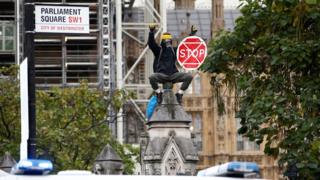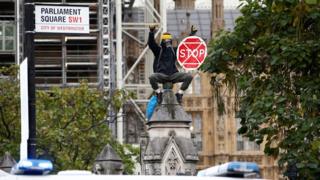Extinction Rebellion activists begin legal fight over protest ban
The group are challenging the police’s ban on London protests, as the number of arrests tops 1,600. …

 Image copyright Reuters
Image copyright Reuters Extinction Rebellion activists have launched legal action over the police’s decision to ban them from demonstrating anywhere in London.
Their lawyers submitted an application to the High Court for a judicial review which they hope will be heard later.
The claimants include the Green Party’s Caroline Lucas and Baroness Jenny Jones, Labour MPs Clive Lewis and David Drew and writer George Monbiot.
There have been more than 1,600 arrests over the ongoing protests, police said.
The Metropolitan Police began clearing protesters from Trafalgar Square on Monday evening.
It followed the announcement of new restrictions under Section 14 of the Public Order Act, which required activists to stop their protests in central London by 21:00 BST or risk arrest.
The force said it decided to impose the rules after “continued breaches” of conditions which limited the demonstrations to Trafalgar Square.
But Extinction Rebellion argued the ban was disproportionate and an unprecedented curtailment of the right to free speech and free assembly.
The group hopes the High Court will quash the decision to implement the blanket ban.
A number of leading lawyers and politicians have criticised the police’s move.
On Tuesday, London Mayor Sadiq Khan said he was “seeking further information” about the decision to impose the ban and why it was necessary, saying he believed “the right to peaceful and lawful protest must always be upheld”.
A government spokesman said the UK was already taking “world-leading action to combat climate change as the first major economy to legislate to end our contribution to global warming entirely by 2050”.
“While we share people’s concerns about global warming, and respect the right to peaceful protest, it should not disrupt people’s day-to-day lives,” he added.
What are the rules around protests?
Police have the powers to ban a protest under the Public Order Act 1986, if a senior officer has reasonable belief that it may cause “serious disruption to the life of the community”.
Police are also under a duty to balance the task of keeping the streets open with the right freedom of assembly under Article 11 of the Human Rights Act 1998 and freedom of expression, under Article 10. These rights are not absolute – the state can curtail them.
However, the BBC’s home affairs correspondent Dominic Casciani said: “The test, if and when it gets to a human rights court battle, is whether police action was proportionate to the threat and only what was strictly necessary.”
By law, the organiser of a public march must tell the police certain information in writing six days in advance.
Police have the power to limit or change the route of the march or set other conditions.
A Section 14 notice issued under the Public Order Act allows police to impose conditions on a static protest and individuals who fail to comply with these can be arrested.




